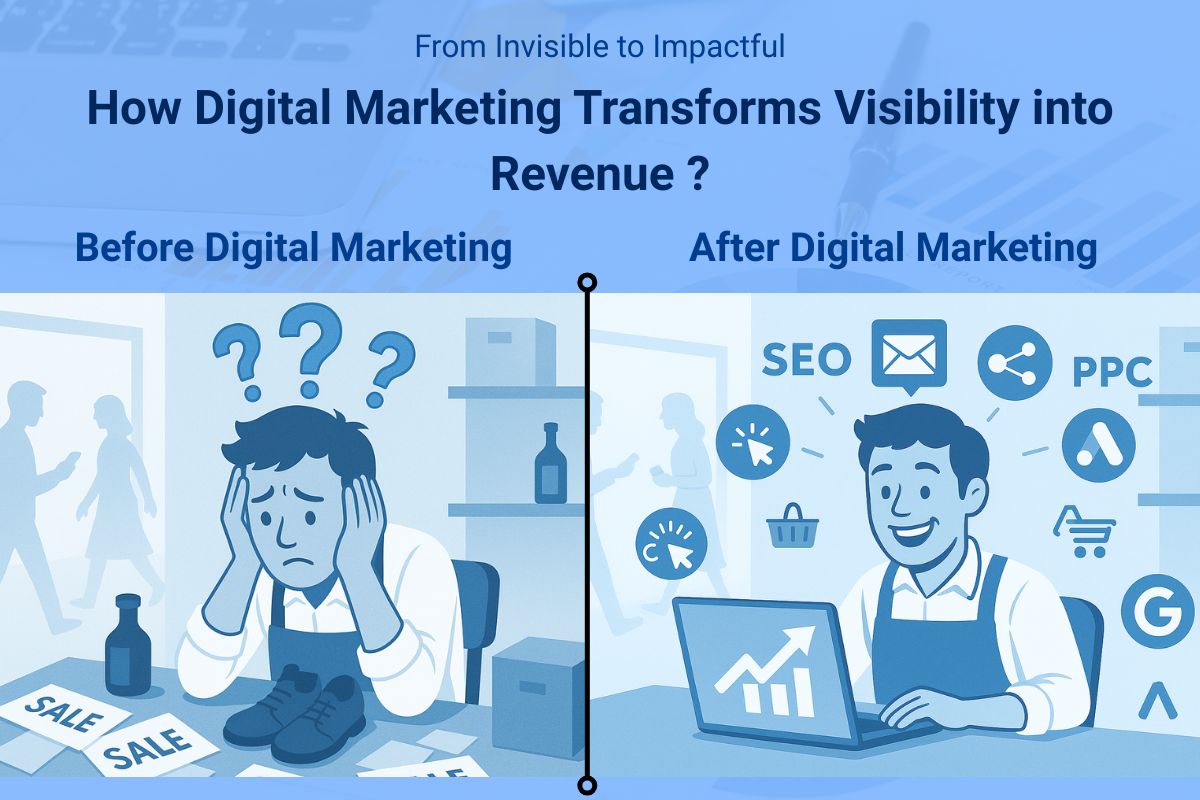
06 June 2025 | Admin
In today’s fast-paced digital world, businesses that fail to embrace online marketing risk falling behind. Whether you’re a small business owner, a startup founder, or a marketing manager, understanding how digital marketing drives revenue growth is essential for long-term success. Traditional marketing no longer delivers the reach, agility, or measurable ROI that modern businesses need. In contrast, digital marketing opens up powerful new ways to connect with customers, optimize sales funnels, and scale profitably.
The Role of Digital Marketing in Business Growth
-
From Billboards to Browsers: A Changing Landscape
Marketing has come a long way from flyers, newspaper ads, and radio jingles. With the rise of smartphones, social media, and e-commerce, consumer behaviour has shifted decisively toward digital platforms. According to a McKinsey report, over 70% of consumers interact with brands online before making a purchase decision. Traditional marketing methods simply cannot match the speed, reach, and personalization that digital channels offer.
Why Digital Marketing Is Crucial?
Digital marketing allows businesses to:
-
1. Reach a global audience with targeted campaigns.
-
2. Engage customers in real-time through social media and email.
-
3. Track performance with tools like Google Analytics and Meta Ads Manager.
-
3. Adapt quickly based on data insights and consumer behaviour.
These capabilities make digital marketing not just a helpful strategy but a revenue generating engine.
Supporting Keywords: role of digital marketing in business, why digital marketing is important for business growthHow Digital Marketing Helps to Grow Your Business
-
1. Boosting Visibility with SEO, PPC, and Social Media
Digital visibility is the first step toward revenue. Search Engine Optimization (SEO) ensures your business shows up when people search for solutions you offer. Paid ads (PPC) and social media platforms like Instagram, LinkedIn, and Facebook allow you to promote offers and drive traffic instantly.
-
● SEO brings long-term, organic traffic.
-
● PPC drives quick, measurable leads.
-
● Social media builds awareness and brand community.
-
-
2. Generating Leads and Converting Them
It's not just about traffic it's about conversions. Through conversion rate optimization (CRO), landing page testing, and retargeting ads, you can turn clicks into customers more efficiently than ever before.
-
3. Establishing Brand Authority with Content Marketing
High-quality content blogs, videos, whitepapers educate your audience and builds trust. Companies that blog regularly generate 67% more leads than those that don’t (HubSpot).
-
4. Leveraging Data and Automation
With tools like HubSpot, Mailchimp, and CRM systems, digital marketing allows businesses to segment audiences and send personalized messages at scale. This improves customer experience and increases lifetime value.
Importance of Customer Segmentation in Digital Marketing
-
Not All Customers Are the Same Treat Them Accordingly
One of the biggest advantages of digital marketing is the ability to segment audiences. By breaking down your customer base into groups based on demographics, behaviour, interests, and purchase history , you can deliver more relevant messages and increase conversions.
-
Better Personalization = Higher Revenue
Personalized emails deliver 6x higher transaction rates than generic ones. Segmentation enables campaigns that speak directly to a person’s pain points or desires, whether they’re a new visitor or a returning buyer.
-
Powerful Tools for Targeting
Tools like:
-
● Google Analytics for behavioural insights
-
● Facebook Ads Manager for custom audience creation
-
● CRM platforms for managing segmented campaigns
...allow you to automate and personalize outreach with high precision.
-
-
Real Example
An e-commerce brand used behaviour-based email segmentation to recover 30% of abandoned carts in a single campaign. This directly impacted revenue with no additional ad spend.
Integrating SEO for Business Website Success
-
SEO: Your Most Valuable Digital Asset
Search Engine Optimization is more than a buzzword; it's the foundation of long-term digital visibility. A well-optimized website generates consistent traffic without paid ads, making it one of the highest ROI marketing tactics.
-
The Three Pillars of SEO
-
1. On-page SEO: Content, keywords, headings, and meta tags.
-
2. Off-page SEO: Backlinks, social sharing, and domain authority.
-
3. Technical SEO: Site speed, mobile optimization, structured data.
-
-
The Power of Local SEO
For service-based businesses, local SEO (Google Business Profile optimization, local citations, location keywords) helps capture traffic with high intent. For example, “dentist near me” searches often convert quickly because the need is immediate.
-
SEO + Content = Inbound Success
By pairing SEO with high-value content, you can attract leads at different stages of the buyer journey all without pushing paid promotions.
How Revenue Increases with a Complete Digital Marketing Strategy
-
Think Holistic: Multi-Channel Is the New Normal
Running isolated campaigns won't yield long-term success. Integrating SEO, PPC, social media, and email creates a synergistic effect where each channel supports the other.
For example:
-
1. SEO brings in organic traffic.
-
2. Retargeting ads convert past visitors.
-
3. Email nurtures leads until they’re ready to buy.
-
-
ROI-Focused Marketing
Performance marketing (e.g., PPC and paid social) provides real-time ROI insights, allowing marketers to double down on what works. When combined with data analytics and testing, your marketing becomes more efficient over time.
-
Case Study: McKinsey Insight
McKinsey’s research shows that companies using digital tools to personalize customer journeys can increase revenue by 5–15% and reduce acquisition costs by up to 30%.
-
Cross-Channel Synergy in Action
Noble Desktop reports that businesses leveraging a complete digital strategy including SEO, content, PPC, and social see significantly higher lead volume and conversion rates than those relying on a single tactic.
Conclusion: Smart Digital Marketing = Sustainable Growth
Digital marketing is no longer optional; it's essential for revenue growth in a competitive market. From building visibility and segmenting your audience to driving conversions and measuring ROI, every tactic contributes to your bottom line.
By investing in a tailored, data-driven digital marketing strategy, modern businesses can:
-
1. Reduce customer acquisition costs
-
2. Increase average order value
-
3. Maximize customer lifetime value
-
4. Scale sustainably

